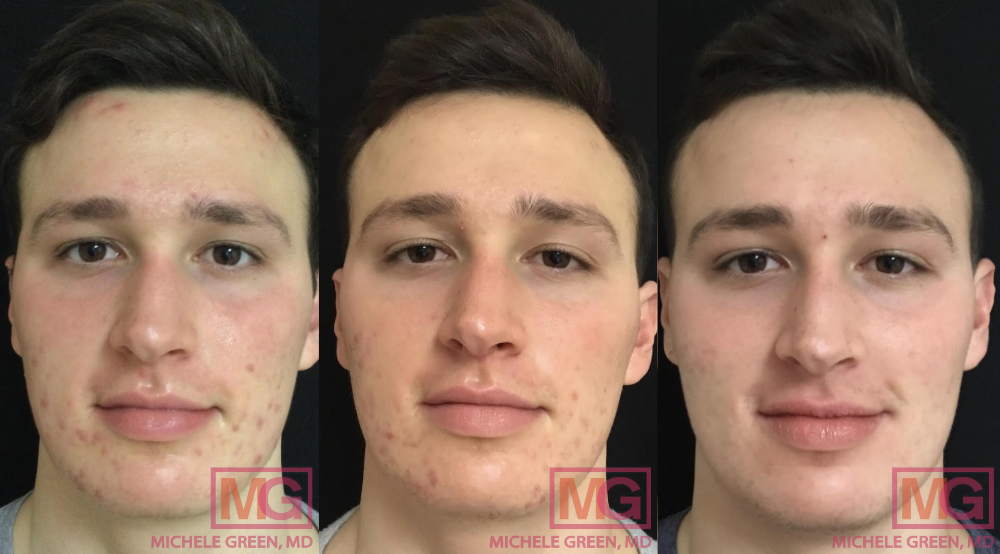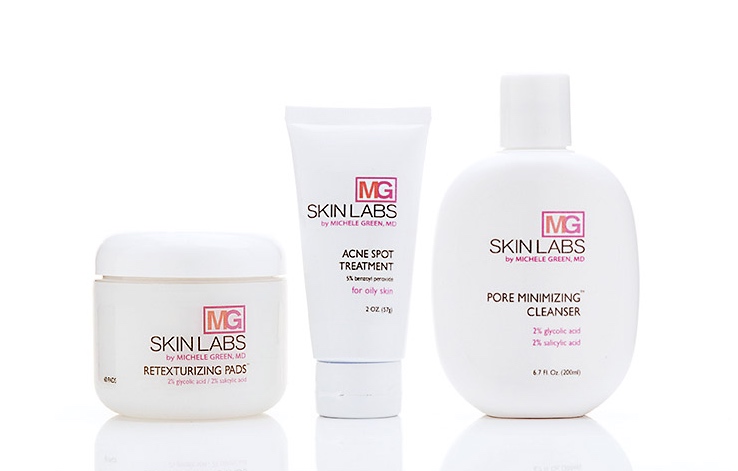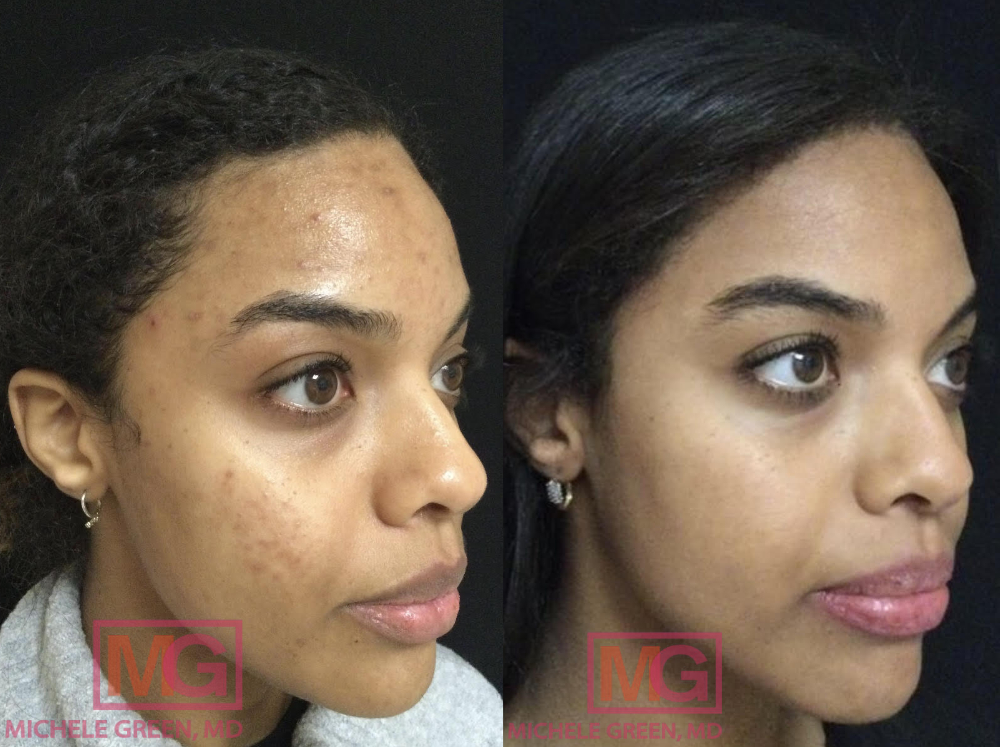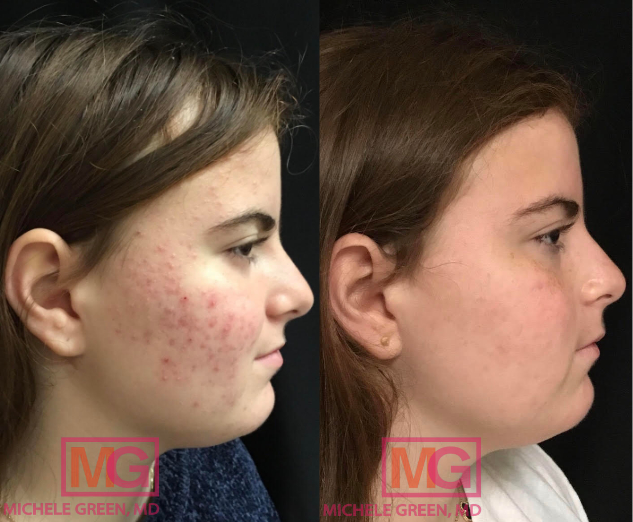Taking Care of Acne in the Summer
For many people, the warm weather of summer signifies a chance to relax, enjoy trips to the beach, take vacations, and participate in other outdoor activities. However, for some, summer brings For many, the warm weather of summer signals an opportunity to relax, enjoy beach trips, take vacations, and engage in other outdoor activities. However, for some, summer brings acne breakouts. As temperatures rise and humidity increases, many individuals experience increased sweating and a buildup of debris on the skin’s surface from the combination of sunscreen and makeup, resulting in oily skin and acne flare-ups. Managing acne treatment and prevention can feel overwhelming, which is why it is advisable to consult board-certified dermatologist Dr. Michele Green in NYC. Dr. Green specializes in treating all types of acne, including summer-related concerns, and will help you permanently eliminate your acne to achieve clear, healthy skin.
There are various treatment options and prevention practices available to address There are several treatment options and preventive practices available to manage summer acne and lessen the likelihood of future outbreaks. Simple preventive measures include showering immediately after sweating and cleaning your linens more often. If these changes are insufficient, a variety of over-the-counter topical cleansers and creams containing benzoyl peroxide or salicylic acid can help remove dead skin cells, unclog pores, and improve your skin’s response to breakouts. If topical treatments do not lead to improvement, it is recommended to consult with Dr. Green to explore the right combination of treatments, such as HydraFacials, prescription medications like oral antibiotics and Spironolactone. Dr. Green can also help you develop a skincare routine with the most effective products available to keep your skin clear and smooth.
Dr. Michele Green is an internationally renowned, board-certified cosmetic Dr. Michele Green is an internationally recognized, board-certified cosmetic dermatologist with over 25 years of experience, providing discerning men and women from around the globe with the finest non-invasive treatment options for acne and acne scars. In her private dermatology practice in the Upper East Side of Manhattan, she expertly utilizes cutting-edge technology and innovative treatment techniques to deliver natural-looking, long-lasting results that help her patients feel like the best version of themselves. She is consistently voted one of New York’s top dermatologists by Super Doctors, New York Magazine, and Castle Connolly. When consulting with Dr. Green, she recommends a unique blend of specially formulated skincare products and in-office treatment options to achieve optimal results, including Botox, dermal fillers, chemical peels, laser treatments, and more.
What is summer acne?
Summer acne is a common type of breakout that occurs during the hot, humid weather of the summer months. The heat and sun exposure raise the body temperature, leading to sweating and resulting in increased oil production by the sebaceous glands. Acne develops when excess oil, sweat, and debris become trapped in the pores. Clogged pores can trigger increased sebum production from the oil glands, further contributing to the buildup of debris in the blocked follicles. Sometimes, when the pores are obstructed, naturally occurring skin bacteria known as cutibacterium can become trapped within them, leading to an inflammatory reaction and more painful pimples. Summer acne can appear as blackheads, whiteheads, pustules, papules, cysts, nodules, or a combination of all these types.
Why do I break out in the summer?
During the summer, the weather can be hot and humid, which often leads to increased sweating. This extra sweat can trap During the summer, the weather can be hot and humid, leading to increased sweating. This excess sweat can trap oil, dirt, debris, and bacteria that cause acne in the pores, resulting in more blemishes during these warmer months. You may be more prone to developing summer acne if you don’t maintain proper hygiene. After exercising or any intense sweating, sweat can cling to your skin if you stay in wet clothes or don’t shower promptly. Sweat left on the skin can trap bacteria and lead to breakouts. It’s crucial to wash your skin and exfoliate after working out to help prevent summer acne. Additionally, if you do not frequently change your sheets and pillowcases, dirt, dead skin cells, and other debris can accumulate and clog your pores. Skincare products may contribute to summer breakouts if they contain a high oil content, as they can produce excess sebum and clog pores. Individuals with acne-prone skin should ensure their skincare products are labeled as non-comedogenic, meaning they won’t clog pores. Some people with acne might use scrubs for exfoliation, but instead of clearing acne, the friction can actually worsen the condition by irritating the skin.

How to prevent summer acne breakouts?
Many factors contribute to Many factors contribute to summer acne, but simple lifestyle changes can help minimize or prevent breakouts. One effective way to prevent summer acne is to improve your hygiene practices, especially regarding workouts and activities that cause sweating. To start, it’s better to wear moisture-wicking, loose-fitting workout clothes instead of tight clothing that traps sweat. Breathable clothing helps reduce sweat accumulation on your skin’s surface. Furthermore, it’s best to remove sweaty clothes and shower as soon as possible after exercising to wash away any remaining sweat. Dr. Green recommends using an oil-free body wash. If showering immediately after exercise isn’t feasible, it’s advisable to use cleansing wipes to remove as much sweat as possible before changing out of damp clothes. While some believe that sun exposure helps improve acne, it can actually worsen it. The UV radiation from the sun dries out the skin, prompting it to produce more oil to compensate for lost moisture. Therefore, it is crucial to practice proper sun protection by using sunscreen and wide-brimmed hats. Broad-spectrum sunscreen with an SPF of 30 or higher should be applied before going outside and reapplied every two hours or after swimming. Some sunscreens may clog pores, so it’s important to choose a non-comedogenic option.
When should you consult a Dermatologist for the treatment of summer acne?
Dealing with acne can be frustrating, and the various treatment options available may feel overwhelming. To help you navigate these options and achieve clearer skin, it is essential to consult a Dealing with acne can be frustrating, and the variety of treatment options available may feel overwhelming. To help you navigate these options and achieve clearer skin, it is important to consult a dermatologist. When left untreated, acne lesions can lead to inflammation, tissue damage, and scarring. Acne scars are permanent and often more difficult to treat than the breakouts themselves. A dermatologist like Dr. Michele Green can prescribe both topical and oral medications and recommend in-office procedures such as acne surgery, chemical peels, and HydraFacials. Dr. Green can also suggest the best non-comedogenic skincare products, including cleansers, acne spot treatments, and sunscreens, available from her proprietary MGSKINLABs, Inc. product line.

In office procedures to treat summer acne
Dr. Green offers a variety of in-office procedures for treating acne at her private dermatology practice. Treatments such as laser therapy, chemical peels, HydraFacials, and acne surgery can help reduce the signs of acne. Laser therapy, like the V-Beam laser, targets the pigment in blood vessels responsible for redness, effectively minimizing it. Patients appreciate the easy access to the V-Beam laser, which requires no downtime. For optimal results, multiple V-Beam treatments spaced a month apart are usually necessary. Chemical peels exfoliate the skin and promote skin cell turnover, removing debris that can clog pores and effectively eliminating blackheads. HydraFacials consist of a three-step process that gently unclogs pores and infuses the skin with beneficial serums for a clear, glowing complexion. A HydraFacial can be enhanced with additional booster serums to address acne and other skin concerns. Acne surgery may be required to remove sebum, dead skin cells, and other debris from deep acne lesions. During acne surgery, the lesion is opened, and its contents are drained before a Kenalog injection is administered to reduce inflammation.
Topical and oral medications for the treatment of summer acne
When it comes to treating acne, over-the-counter topical creams may sometimes be inadequate on their own. After your initial consultation with Dr. Green about acne treatment, she may conclude that effective care for your skin condition requires prescription therapy involving topical or oral medications. A variety of medications can effectively improve acne, including vitamin A derivatives, antibiotics, and androgen blockers. Vitamin A derivatives include topical retinols and retinoids, as well as the oral medication isotretinoin. These medications reduce sebum production and dry out the sebaceous glands to prevent clogged pores. Oral or topical antibiotics help decrease the presence of acne-causing bacteria on the skin. Commonly prescribed topical antibiotics include erythromycin and clindamycin. Frequently prescribed oral antibiotics for acne are minocycline, tetracycline, and doxycycline. The primary oral androgen blocker is spironolactone, which reduces testosterone levels and helps improve acne in females. Many prescription acne medications increase sun sensitivity in patients, so it’s essential to use broad-spectrum sunscreen with an SPF of at least 30 during the treatment and reapply it every two hours.
Best Skincare for summer acne
People who suffer from acne during the summer can greatly benefit from a Individuals experiencing acne during the summer can significantly benefit from a skincare routine that includes the right ingredients. Dr. Michele Green has created MGSKINLABs, a line of skincare products specifically formulated with powerful ingredients to treat and prevent acne lesions. Within MGSKINLABs, you’ll discover the Acne Kit, a three-step treatment featuring oil-free products that effectively cleanse the skin and manage acne breakouts. The first step is the Pore Minimizing Cleanser, which contains salicylic acid to provide gentle chemical exfoliation while clearing out the pores. The Retexturizing Pads also include glycolic and salicylic acid for further cleansing and enhancing skin texture. Finally, the Acne Spot Treatment incorporates 5% benzoyl peroxide to eliminate acne-causing bacteria, dry out acne lesions, and reduce inflammation. Regardless of skin type or season, moisturizer remains a crucial element of any skincare routine, especially for those with oily or acne-prone skin. Many individuals with acne-prone skin prefer a lightweight, oil-free moisturizer that won’t clog their pores. MGSKINLABS, Inc.’s Ultimately Sheer Hydrating Lotion is an excellent choice for these individuals. It helps regulate oil production, prevents excess sebum buildup, and offers a matte finish, making it ideal for acne-prone skin.
Another essential element of a good skincare routine in the summer is sunscreen. Choosing a non-comedogenic sunscreen is ideal for those with oily or acne-prone skin. Dr. Green’s MGSkinLabs, Inc. offers an oil-free Hydrating Sunscreen with SPF 50, which combines a moisturizer and SPF into one product. This type of sunscreen is perfect for anyone looking to keep their skin hydrated and radiant while protecting against UV rays that can cause skin cancer and premature aging. When you consult with Dr. Green, you’ll have the chance to discuss an effective skincare routine, including which products should be part of your regimen. She will work with you to develop a personalized skincare plan that includes the right topical medications and products to help you achieve a healthy, clear, and smooth complexion that lasts.
Will sunscreen make acne worse?
Sunscreen does not worsen acne; in fact, it can help minimize it. An essential part of any effective skincare routine is sunscreen, especially for those dealing with summer acne. The sun’s UV rays can aggravate acne, making it crucial to protect the skin with a non-comedogenic sunscreen to prevent further flare-ups. Dr. Green’s MGSKINLABs, Inc. offers a non-comedogenic Hydrating Sunscreen with SPF 50 that combines moisturizing properties with sun protection. This type of sunscreen is perfect for individuals who want to keep their skin hydrated and radiant while protecting against UV exposure that can lead to skin cancer and premature aging. During your consultation with Dr. Green, you can discuss a suitable skincare regimen, including which products should be incorporated into your routine. She will work with you to create a personalized skincare plan that includes the right topical treatments and products to help you achieve a healthy, clear, and smooth complexion that lasts.
FAQ about Summer Acne
How to fight acne in summer?
Acne that appears in the summer can be frustrating for many. Thankfully, there are many treatment options available to fight summer acne, from over-the-counter topicals to prescription medications and in-office procedures performed by a healthcare provider. Products containing benzoyl peroxide and salicylic acid are great first options. However, some patients may require stronger prescription medications to clear their acne. In this case, it is time to consult with a board-certified dermatologist, such as Dr. Green in NYC.
How to get rid of acne during summer?
Many of Dr. Green’s patients ask, “Many of Dr. Green’s patients ask, “How do you get rid of summer acne on your face?” The first step in treating acne is to consult a board-certified dermatologist, such as Dr. Michele Green in New York City. During your consultation with Dr. Green, she will gather a comprehensive medical history and assess your skin before developing a personalized treatment plan that may include over-the-counter topicals, prescription medications, in-office procedures, or a combination of these options to help achieve clear, acne-free skin for patients.
Does acne go away in the summer?
Some patients with acne ask Dr. Green Some patients with acne ask Dr. Green, “Will my acne go away in the summer?” The answer is that it depends. Some patients notice their acne improving in the summer, while others experience worsening acne. During the summer months, increased heat and humidity can trap excess oil, dead skin cells, and debris in the pores, potentially leading to new acne lesions.

Why am I breaking out in hot weather?
A common question among patients is, “A common question among patients is, “Why is my acne worse in the summer?” During hot summer weather, the body produces more sweat and oil. The heat brings strong UV radiation from the sun. Many people use sunscreen to protect their skin; while this is important, some sunscreens can be comedogenic and clog pores. Acne lesions form around clogged pores, and in the summertime, there is an abundance of oil, sweat, and debris that can block pores. If you experience breakouts and new acne during the summer, it may be time to consult a board-certified dermatologist, such as Dr. Michele Green in NYC. Dr. Green takes a holistic approach and will physically evaluate your skin before creating a tailored treatment regimen that includes a unique combination of targeted skincare products, medications, and in-office procedures to help you achieve clear, acne-free skin.
Is acne better in summer or winter?
Some patients notice their acne fluctuates with the seasons, and when it improves, it will differ from patient to patient. Hot weather and increased humidity encourage the body to create Some patients notice that their acne fluctuates with the seasons, and when it improves, the extent of this improvement varies from patient to patient. Hot weather and increased humidity encourage the body to produce excess oil. Along with sweat and greater sun exposure, this excess oil often results in clogged pores and acne during the summer.
Maintaining skin balance in winter can be challenging due to the dryness caused by the weather. Cold air naturally holds less moisture, and the heat in your home or office, in addition to hot showers, contributes to dry skin and rashes during the winter. In response to this change in skin health, your body increases sebum (oil) production. However, excess sebum can clog your pores and lead to winter acne. To combat the dry skin of winter, it is important to use moisturizers with ingredients such as hyaluronic acid or niacinamide to boost skin hydration. However, it is advisable to avoid comedogenic moisturizers that can block pores.
How to get rid of humidity acne?
To treat humidity-related acne, it is crucial to keep the skin clean and eliminate sweat and oil that can build up. Use a gentle cleanser or an exfoliating cleanser containing alpha or beta hydroxy acids, such as glycolic acid, to wash your face and remove sweat, dirt, and excess oil. Avoid heavy creams and choose non-comedogenic moisturizers to keep your skin hydrated without clogging pores. Incorporating a benzoyl peroxide treatment can effectively target acne-causing bacteria and reduce inflammation. Lastly, wear lightweight, breathable fabrics that wick away sweat, which can trap bacteria and debris in the pores.
How to cure acne due to heat?
To cure acne caused by heat, it’s essential to keep the skin clean and remove anything that can To treat acne caused by heat, it’s important to keep the skin clean and eliminate anything that can clog the pores. After sweating, shower immediately with a cleanser designed for acne-prone skin to wash away sweat and debris. Using a lightweight, oil-free moisturizer can help maintain hydration without blocking pores. If acne persists, you may need to use a prescription topical or oral medication to clear it up. When you consult a board-certified dermatologist like Dr. Michele Green, she will collect your complete medical history and assess your skin before developing a personalized treatment plan to clear your acne. It’s crucial to avoid picking or popping acne lesions, as this can cause trauma that may lead to post-inflammatory hyperpigmentation and scarring, which are often more difficult to treat than the original acne breakout.
How to get rid of sun acne?
Sun acne forms from extensive UV exposure, which dries out the skin, causing it to produce more oil for hydration. One of the best ways to treat it is to prevent it by practicing proper sun protection. Excess oil from overactive sebaceous glands can clog pores and lead to acne breakouts. Wearing sunscreen outdoors protects the skin from drying, which helps prevent excess sebum production. Patients should choose a non-comedogenic, broad-spectrum sunscreen to wear regularly. A non-comedogenic skincare product does not clog pores. It should also have a minimum SPF of 50. Sunscreen needs to be reapplied every ninety minutes while outside and thoroughly washed off at the end of the day to maintain clear, acne-free skin. Opting for a non-comedogenic lotion formula for sunscreen is ideal for those with oily or acne-prone skin. Dr. Green’s specialty line of skincare products, MGSKINLABS Inc., offers a non-comedogenic Hydrating Sunscreen with SPF 50 that also serves as a moisturizer. This type of sunscreen is ideal for those looking to simplify their skincare while keeping their skin moisturized and healthy, all while protecting against harmful UV rays that contribute to skin cancer and signs of aging.

What is summer acne called?
Summer acne, sometimes called heat acne or sweat acne, often worsens during the summer due to increased sweat and debris building up on the skin. A related type of acne that frequently appears in the summer is Mallorca acne, also known as acne aestivalis. This condition is characterized by the sudden appearance of small, red, inflammatory bumps on areas of the body exposed to the sun. It typically occurs during the summer months when ultraviolet (UV) radiation levels are at their peak.
What do sweat pimples look like?
Sweat Sweat pimples can resemble various types of acne lesions, including whiteheads, blackheads, papules, pustules, or small raised bumps. They often appear in clusters in areas where sweat accumulates, such as the face, chest, back, buttocks, and thighs. Heat rash occurs when sweat becomes trapped in the sweat ducts, leading to inflammation. Sweat pimples can be mistaken for heat rash due to their similar appearance. To treat sweat pimples, it’s essential to use a gentle cleanser or acne wash, along with non-comedogenic products. If you’re unsure whether you have sweat pimples or heat rash, consult a board-certified dermatologist like Dr. Michele Green, who will examine your skin and create the right treatment plan to help you achieve a lasting clear complexion.
How do you get started with summer acne treatment today?
The The summer months bring hotter and more humid weather, which can lead to increased sweating and products that clog pores, causing acne. While some lifestyle changes can help improve summer acne, in some cases, they are insufficient for treatment. It’s crucial to address summer acne with a board-certified dermatologist who can create a personalized treatment plan for you to achieve clear, acne-free skin. If you’re struggling with summer acne, many prevention methods and treatment options can help. Scheduling a consultation with an acne expert like Dr. Michele Green in NYC is the best way to understand and manage your breakouts, helping you attain clear, acne-free skin.
Dr. Michele Green is a board-certified dermatologist internationally recognized for her holistic approach to treating acne, body acne, and acne scars. For over two and a half decades, she has been helping discerning men and women from around the world achieve a natural-looking, youthful appearance. She is particularly focused on assisting patients with acne breakouts in achieving clear skin. Dr. Green has developed a line of specially formulated skincare products, MGSKINLABS, Inc., which includes topical acne treatments for individuals with acne-prone skin. She takes the time to understand the underlying factors that contribute to acne and tailors treatment protocols to fit each patient’s specific needs. Her dedication and expertise are evident, as she is consistently recognized as one of New York’s best dermatologists by Castle Connolly, Super Doctors, and New York Magazine. To eliminate acne and achieve a clear, healthy, radiant complexion that lasts, please call Dr. Michele Green’s NYC office at 212-535-3088 or contact us online today to schedule a consultation.
 212-535-3088
212-535-3088